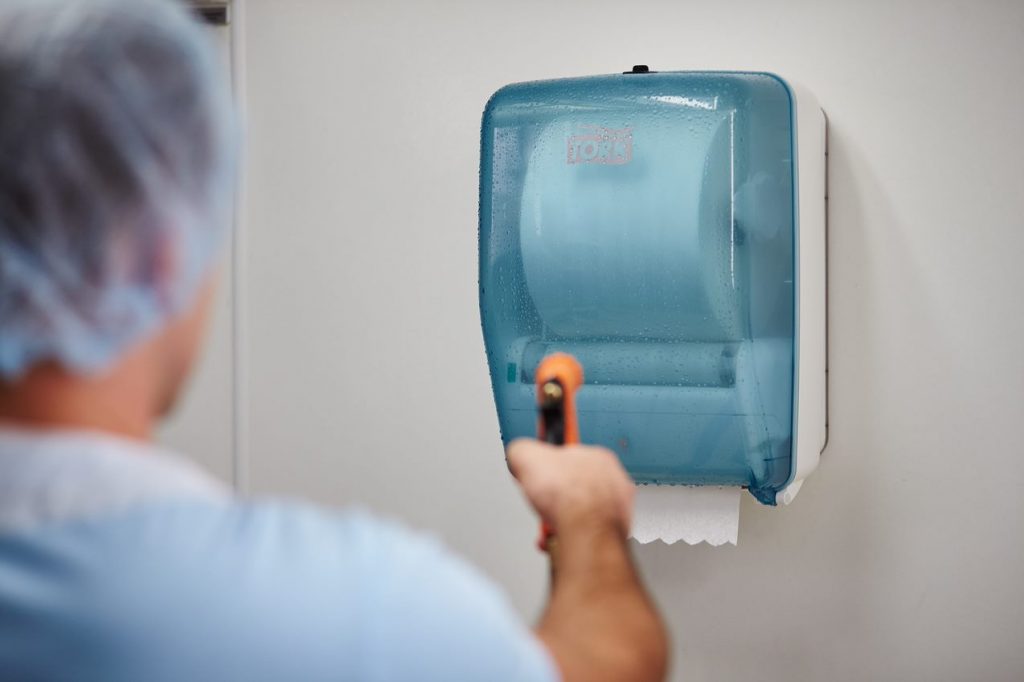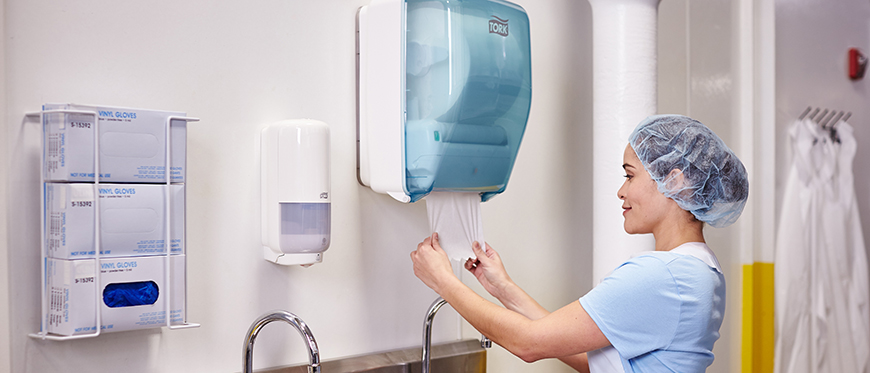Food processing manufacturers place extreme importance on keeping customers and employees safe and healthy. A big part of how they do this is by consistently following government and industry hygiene and safety regulations. Over the past few years, however, food processing manufacturers have experienced lower production capacity an average of 3.2 times as a result of food safety incidents and a failure to comply with protocols.1 Even a small compliance failure can slow or stop production, trigger unexpected expenses, and damage a company’s reputation.
While food processors operate with very high standards, sustaining compliance levels efficiently while maintaining productivity can be challenging. More than half of food processing production managers find it difficult to motivate workers on the production line to consistently abide by demanding requirements.1 Robust, easy to maintain and well-stocked hygiene and cleaning dispensers, placed exactly where needed, can increase hygiene compliance and efficiency.
A period of change and challenge for food processing manufacturers
The food processing industry continues to adjust to dramatic changes in customer demand, hygiene expectations, productivity requirements, and sustainability goals.
An industry shift: An increase in the demand for food and beverages to be consumed at home, instead of in restaurants and other establishments, made it difficult for manufacturers to adjust their production lines while maintaining output. Disruptions in supply chains added more complications.
More compliance requirements: Stricter pandemic-related regulations have forced companies to require more frequent disinfecting and hand washing. Food processing manufacturers have also implemented safety practices like social distancing and temperature checks. The requirements vary for different zones, such as on the production floor versus locker rooms. These extra hygiene-related tasks require ongoing training and monitoring of employees to ensure compliance. Unfortunately, they can also slow production and reduce efficiency.
To gain clarity on hygiene compliance efforts, food processing managers should examine:
- How often are employees trained on hygiene compliance?
- Who is responsible for training and monitoring them?
- How much does waste due to contamination cost your business?
A focus on increased productivity: Food processing is a highly competitive industry. Managers use continuous improvement principles and methods to identify and implement efficiencies wherever possible. But these must always be balanced with the need to maintain the same high levels of employee safety and product quality. This includes when facilities may be short-staffed due to a lack of qualified labor.
Consider these questions when investigating how to support productivity:
- How much downtime does your company face due to hygiene demands, cleaning equipment, etc.?
- Does your current layout allow for workers to easily access the cleaning equipment they need?
- How much time could you save if you made the process of cleaning equipment and machines more efficient?
A drive to improve sustainability: There is a growing movement to reduce the environmental impact of food processing operations. Some of this pressure comes from consumer and retailer demand. Increasingly, however, large companies are setting their own sustainability goals and using products that require renewable or fewer natural resources.
When it comes to sustainability efforts, questions to consider include:
- What are the key sustainability actions or practices your company considers most crucial?
- Does your company have sustainability targets?
- Do you have expectations for suppliers?
- How do you evaluate suppliers that offer cleaning products with sustainability claims?
Efficiently maintain hygiene standards
Choosing the right products and placing them in strategic areas around a facility can help food processing managers balance efficiency, safety, and productivity with a more streamlined and organized workflow—even addressing sustainability concerns.
Hygiene compliance: Encouraging employees to follow compliance standards is often a matter of providing the right equipment in the right place. 82% of food processing production managers say they have experienced production delays due to a compliance failure with hygiene protocols.1 However, 94% of production managers agree increasing accessibility to hygiene and cleaning materials can improve employee compliance with those regulations.1

- The Tork Washstation Dispenser is a food-contact approved product that is HACCP certified. It’s water- and corrosion-resistant, so it can be sprayed down and cleaned in place. This also makes it ideal for meeting compliance regulations specific to wet and humid environments.
- The Tork PeakServe® Continuous™ Paper Hand Towel Dispenser ensures employees only touch the towel they use thanks to a hands-free mechanism.
Productivity and efficiency: Streamlined workflows are key to improving productivity, say 97% of production managers. 95% of them agree that a lack of readily available hygiene and cleaning supplies can negatively impact efficiency. Optimizing workflows on the production floor with the efficient placement of easy-to-clean, high-capacity hygiene and cleaning dispensers can help workers find and retrieve materials quickly.
- The Tork Folded Wiper Dispenser offers a permanent wall-mounting option and a flexible magnet option, enabling it to be easily moved where needed.
- The high-capacity Tork Washstation Dispenser supports productivity by reducing the need for frequent refills. It also features a push button instead of a key to open, which saves valuable time when refilling.
Sustainability: 95% of managers believe that lessening the negative impact of their business on the environment is important.1 Even small changes over time—such as using more environmentally sensitive products—can make a significant difference.
- Tork’s sustainability credentials and products highlight our commitment and ability to help manufacturers meet their sustainability targets.
- In particular, our biobased heavy-duty cleaning wipers help conserve natural resources.
See how you can maintain efficient hygiene compliance with Tork
Tork offers a range of easy-to-clean, high-capacity hygiene products designed to help you continue to meet increasingly stringent standards while also supporting high productivity and efficiency. Get a customized recommendation for your site or facility.
Sources
1 2021 Survey conducted by PRS Invivo in March 2021. The survey covered in the US and Germany, with 100 respondents in each market.
